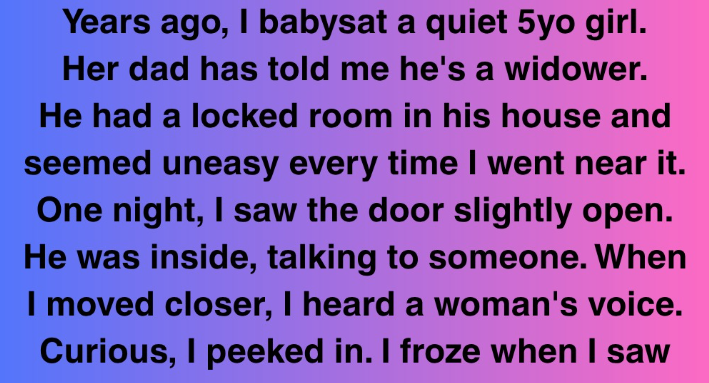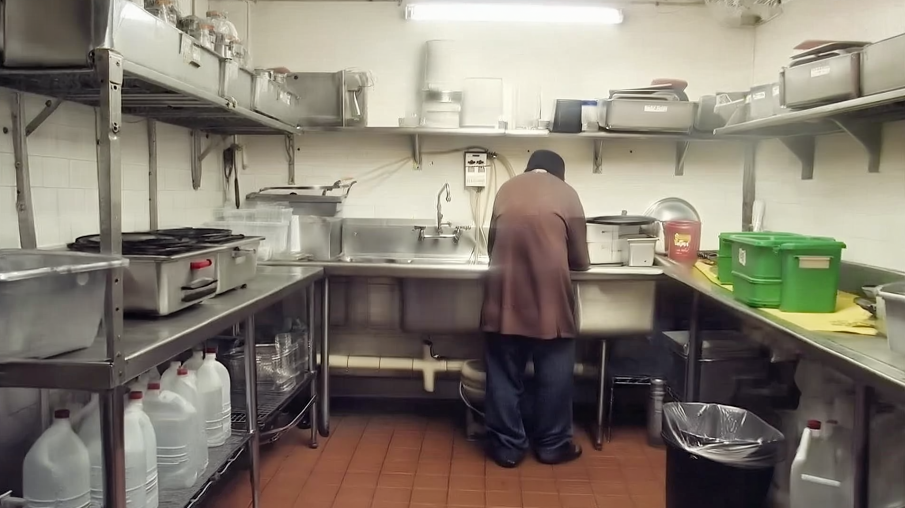Several years ago, I watched over a soft-spoken 5-year-old named Suri.
Her father, Kavian, shared that he was a widower.
His home held a room he kept locked, and he grew tense whenever I lingered near it.
One evening, I noticed the door slightly ajar.
Inside, Kavian was speaking to someone. As I edged closer, a woman’s voice reached my ears.
Intrigued, I peered inside. My breath caught when I saw—
—Kavian alone in the dim room, gazing at a photograph on the wall.
It was a striking framed image of a woman—radiant, with long dark hair, a gentle smile, cradling a newborn.
He sat cross-legged on the floor, murmuring softly.
Yet I had heard a voice. A living, breathing voice. Not a recording. Not imagined.
It had come from that room.
I stepped back, pulse racing, questioning if I’d misheard.
Could it have been a TV in another room? Perhaps a video playing?
But when a floorboard creaked under my foot, Kavian spun around, eyes wide, as if I’d stumbled upon a forbidden secret.
He rose swiftly. Closed the door.
Said, “That room is private. Please respect my wishes.”
I nodded, mumbled an apology, and returned downstairs to Suri.
She was coloring on the floor, humming softly, unaware of the moment that had just unfolded.
After that night, I steered clear of the door.
Yet a strange unease lingered. Something felt unspoken.
I was 17 then, babysitting to earn extra cash.
Kavian seemed kind. Reserved, courteous, always paid promptly.
Perhaps too courteous, keeping a careful distance.
But small details began to catch my attention.
Sometimes I’d arrive and notice two mugs in the sink.
Or a woman’s scarf draped over a chair.
Once, while helping Suri search for her doll, I found a gold earring beneath the couch.
I asked Kavian about it.
He offered a faint smile and said, “My wife passed, but her belongings remain.”
Reasonable enough.
But the oddities grew.
One afternoon, Suri said, “Mommy says your hair is pretty.”
I paused. Gently, I replied, “Sweetie, your mommy isn’t here anymore, right?”
She looked puzzled, then shrugged and returned to her coloring.
Kids say peculiar things, I reassured myself.
But I began to observe more closely.
On occasion, I thought I heard footsteps upstairs while alone with Suri.
Once, after stepping out of the bathroom, I found Suri in the hallway, staring at the locked door.
She said, “They’re arguing again.”
They.
That word sparked a deeper concern.
I started arriving a bit earlier, hoping to glimpse the end of Kavian’s day before he left.
One time, I saw a woman slip out through the back gate as I entered from the front.
She wore a long coat, hood raised, moving quickly.
I called out, but she didn’t turn back.
Inside, Kavian seemed unsettled. Said he had to leave.
I wanted to ask directly—Who was that woman? Does she live here? Why does Suri talk about her mom as if she’s present?
But his expression stopped me. Not fear, but something like shame.
Still, my curiosity gnawed.
One night, I made a mistake.
Suri had fallen asleep early. Kavian wouldn’t return for another hour.
I stood by the locked door, listening.
Silence.
But the door wasn’t locked this time.
It creaked open at my touch.
Inside, the room felt frozen in time.
Photographs, neatly folded clothes in drawers, perfume bottles, a pair of heels tucked under the dresser.
The woman’s presence filled the space.
I stepped inside cautiously, then froze.
A phone.
It glowed on the nightstand, warm to the touch, recently used.
I retreated quickly. Said nothing when Kavian returned.
But sleep eluded me that night.
I didn’t return the following week.
I told Kavian I was swamped with exams.
Yet guilt over leaving Suri tugged at me.
Two weeks later, I called Kavian to check in.
He sounded surprised but grateful to hear my voice.
He asked if I could babysit again, just for one night.
An urgent work meeting left him with no one else to watch Suri.
I agreed.
That night shifted everything.
When I arrived, Suri sat barefoot on the porch.
Kavian wasn’t home yet.
I asked who let her outside.
She pointed to the door and said, “Mommy said we could wait for you.”
My heart chilled.
We went inside. I locked the door behind us.
I tried to stay calm. Perhaps she’d imagined it. Maybe Kavian had let grief blur boundaries.
Then I noticed the upstairs hallway light glowing.
And soft music—a lullaby—drifting from somewhere.
I scooped up Suri, my heart racing, and climbed the stairs slowly.
The music came from that room.
I stepped inside.
No one was there.
But on the mirror, etched in fog—as if someone had exhaled on it—were the words:
“She needs stability. Leave her alone.”
I backed away quickly. Called Kavian, my voice trembling.
Told him what I’d seen.
He returned in ten minutes.
For the first time, he looked truly shaken.
He sat me down and said something unforgettable.
“You’re right. My wife isn’t gone. But she isn’t fully here, either.”
He explained that when Suri was a toddler, his wife, Taraneh, had a psychotic break.
One morning, he found her in that room, rocking back and forth, insisting their baby was missing—while Suri slept peacefully in her crib.
She was diagnosed with schizophrenia.
Treatment helped, but she’d reject it, insisting everyone was deceiving her.
She refused medication.
Kavian couldn’t bear to institutionalize her.
So he kept her in the house.
She lived in that room, eating and sleeping there, whispering through vents when she thought no one heard.
He installed locks—inside and out—for her safety and Suri’s.
He told Suri her mother had passed. What else could he say?
He wanted to shield her from fear.
But Taraneh wouldn’t stay hidden. She emerged when he was away.
That was who I’d seen. The scarf, the earring, the footsteps.
Not a ghost. Not grief.
A woman, ill, trapped in a reality her mind had woven.
I was stunned. Torn between tears and the urge to flee.
But Suri sat there, humming, untouched by the weight of it all.
I asked Kavian why he didn’t seek help.
He looked down. Said, “Because I love her. And I know if I let them take her, they’ll dull her until she’s no longer the woman I married.”
I didn’t agree. I still don’t.
But I understood.
That night, I stayed with Suri while Kavian spoke to Taraneh.
He told her things had to change. That this couldn’t continue.
I don’t know what unfolded in that room.
But I heard quiet sobs through the wall.
The next morning, I returned.
And for the first time, I met her.
Her name was Taraneh.
She looked fragile, but her eyes held clarity.
She offered me tea. Apologized for frightening me.
She said, “I wanted to protect Suri. I didn’t know how to be her mother anymore.”
After that, Kavian arranged treatment for her.
It took months.
There were setbacks.
Tears.
Supervised visits with Suri, arranged through the courts.
But slowly, healing began.
Suri learned the truth in small, gentle pieces.
She didn’t resent them.
She was confused, yes—but children forgive more easily than we expect.
Five years later, they live in a new home.
Smaller, calmer.
Taraneh takes medication. She’s stable.
Kavian remains by her side.
Suri’s in middle school now. Dreams of becoming a writer.
And me?
I still babysit occasionally.
But mostly, I visit as a friend.
Sometimes we sit on their porch, and I reflect on how close I came to walking away for good.
It would’ve been simpler.
But sometimes the difficult path is the one that transforms everything.
If there’s one lesson I carry, it’s this: silence helps no one. Speak up. Ask questions. Stay curious—yet always kind.
You never know whose life you might quietly help shift.
If this story touched you, please like and share. Someone out there may need to read it today.



